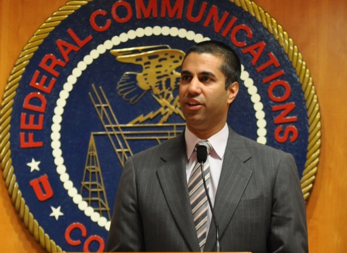Ajit Pai’s World, Winning Afghanistan, and the Next Cool City
Here’s What You Need To Know
This week is “Tech Week” at The White House, with Administration officials conducting meetings with a broad group of tech leaders and investors to discuss the effect regulations have on emerging technologies, the challenge of crafting immigration policy for high-skilled workers, and other tech-related policy issues. In the spirit of “Tech Week,” we here at Delve have taken a look at some of the key efforts of the Trump Administration in this area of policy.
Evaluating Trump’s approach to tech policy requires understanding the personnel he has appointed to work on those issues. One of the most significant leaders in setting Trump’s tech agenda is Federal Communications Commission Chairman Ajit Pai.
First appointed to one of the Republican FCC seats in May 2012, Pai spent most of the past couple years fighting President Obama’s FCC Chairman, Tom Wheeler, on several issues, only to get outvoted and ignored in partisan fashion. Pai is now promising a more fair and inclusive process to all sides because he believes, “The commission is much stronger when it speaks with a unified voice.”
Subscribe to Receive Insights
"*" indicates required fields
More importantly, now that he is the Chairman, Pai has a checklist of policy initiatives he is working through:
- Pai has already accomplished several things, including expanded investment in rural broadband infrastructure through approval of $170 million in federal grants and limiting the scope of the FCC’s authority on prison phone calls and other issues.
- There are also important items on tap for Pai, including the creation of the Office of Economics and Data (OED) by the end of 2017 to help institutionalize an economics-based approach to the FCC’s decision making.
- But on some of the biggest issues, Pai’s approach remains unknown, including how he will replace net neutrality regulations and deregulate broadband development.
Pai has argued the FCC, “should do everything it can to ensure that its rules reflect the realities of the current marketplace.” If he is successful in translating his philosophy into real policy, the tech world will take on a completely different look. As part of Delve’s ongoing analysis of the Trump Administration through The Administration Project (TAP), we prepared a brief note for our TAP subscribers that goes in depth on Chairman Pai’s agenda and how it will shape the tech industry. As a loyal TL;DR reader, we’re offering you access to the full note for free here.
News You Can Use
BIG DATA, BIG PROBLEMS
Big data was once heralded as the key to solving any number of major issues facing our society. But, a Wall Street analyst turned progressive activist, Cathy O’Neil, has argued in her new book – Weapons of Math Destruction: How Big Data Increases Inequality and Threatens Democracy – that efforts to eliminate bias through data have become biased themselves. For years, big data was seen by policymakers as a way to eliminate bias from government and private sector initiatives, but now data has begun to create its own biases.
Data on trivial activities – like what websites a person frequents or where they shop – are being used to make significant determinations like how likely a person is to repay a loan or their potential for criminal behavior. O’Neil concludes we must inject “human values on these systems.” But, this presents its own new conflict: who gets to decide what those values are and how to impose them on these algorithms meant to produce unbiased policies and programs.
WHAT DOES WINNING LOOK LIKE IN AFGHANISTAN?
With President Trump delegating his authority to determine troop levels to Defense Secretary James Mattis, it is worth considering how Trump can best achieve success there. Former Deputy U.S. Treasury Attaché to Saudi Arabia Morgan Ortagus, and former National Security Council senior advisor Samantha Vinograd, recently published an op-ed arguing Trump should ask four questions to determine to the best path forward in Afghanistan:
- Whether the U.S. intelligence community still believes there is a significant and direct national security threat to the U.S. or its allies emanating from Afghanistan;
- What Trump’s national security team sees as the clearly defined U.S. goals in Afghanistan for the next four years;
- How the military can best recalibrate resources to achieve these goals;
- How his foreign policy team can get Pakistan more constructively involved in achieving these goals.
Ortagus and Vinograd say these questions must be answered to define success in Afghanistan and to clearly define how and why our troops must deploy in order to support continued operations in the nation.
PROFITS FROM THE SHARING ECONOMY
With a recent Pew study estimating that nearly a quarter of all Americans earn money through sharing economy platforms like Airbnb, Uber, TaskRabbit, and others, it is worth considering how much money people actually earn from the gig economy. Based on the earnings from these platforms listed on tens of thousands of loan applications, the Priceonomics blog found that 85 percent of these gig-economy workers earn less than $500 a month – with Airbnb hosts earning the most by far.
These figures could easily be trotted out by those who argue this new way of engaging workers requires regulation or reform in order to ensure these workers are not dramatically underpaid. Left unclear, however, is how many of these workers are using these “jobs” to make a little extra money versus trying to forage a full-time living.
THE EMPTY BENCH
Democrats are already gearing up to face off against President Trump in 2020, but the Democratic bench for presidential candidates appears to be exclusively populated with old political operators unlikely to inspire excitement among the party or the country, and fresh-faced newcomers with personal brands and messages that are entirely untested when it comes to reaching beyond their core supporters.
Outside of former Vice President Joe Biden, Sen. Elizabeth Warren (D-MA), and Sen. Bernie Sanders (I-VT), there are nineteen other Democratic names being floated as potential candidates – and a recent POLITICO/Morning Consult poll found at least half of the electorate has never heard of any of them. The bench is so empty that a failed U.S. Senate candidate, Jason Kander, is getting noticed as a 2020 contender in early primary states. With roughly 18 months to go until 2020 presidential campaigning begins in earnest, this position does not bode well for those desiring a Democratic comeback.
THE NEXT PORTLANDIA
Boutique hoteliers are trying to manufacture “cool” in up-and-coming mid-size cities with less-than-hip reputations, many of which also have struggling local commercial economies. The targets of these hotel operators are in various stages of cultural bloom, with cities like Detroit, Pittsburgh, and Savannah further along than cities like Asbury Park, Milwaukee, or El Paso. All of these cities are competing to become what many of the hotel owners refer to as “the next Portland.”
If they bet on the right cities, there can be big money for businesses in these smaller markets, and the trajectory appears somewhat standard: an art community establishes itself, which brings with it pieces to showcase, followed by craft breweries, distilleries, bars, and “foodie” restaurants, which then garner national attention. It remains to be seen whether this model for building hip travel destinations can create long-term growth, but boutique hotel operators and local communities are betting it can create fast-growing small-scale economies in the short-term.
ANOTHER FORUM SHOP CLOSED
Drug-maker Bristol-Myers Squibb (BMS) scored a victory in a lawsuit with the State of California over California residents who claim they were harmed by the BMS drug, Plavix. In a major ruling scaling back where drug companies can be sued, the U.S. Supreme Court issued an 8-1 ruling this week declaring that out-of-state residents could not join California’s lawsuit.
Justice Samuel Alito, writing for the Court, argued that, “The mere fact that other plaintiffs were prescribed, obtained, and ingested Plavix in California – and allegedly sustained the same injuries as did non-residents – does not allow the State to assert specific jurisdiction over the nonresidents’ claims.” This is the second ruling in the past month in which the Supreme Court has issued a ruling scaling back plaintiffs’ ability to “forum shop” – the term for plaintiffs bringing lawsuits to courts more likely to hand down favorable verdicts – making this a particularly devastating summer for trial lawyers and plaintiffs’ attorneys.



